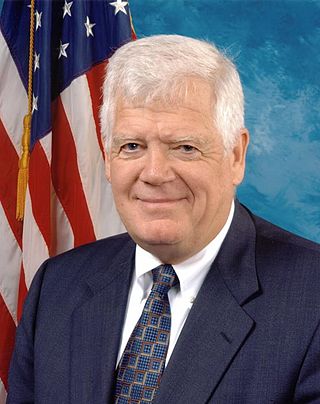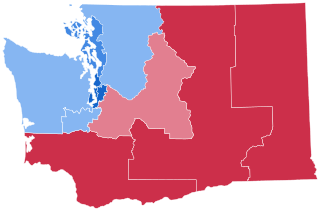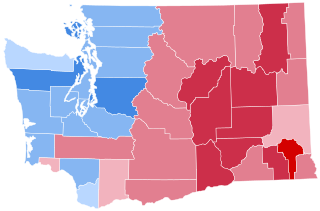Related Research Articles

Newton Leroy Gingrich is an American politician and author who served as the 50th speaker of the United States House of Representatives from 1995 to 1999. A member of the Republican Party, he was the U.S. representative for Georgia's 6th congressional district serving north Atlanta and nearby areas from 1979 until his resignation in 1999. In 2012, Gingrich unsuccessfully ran for the Republican nomination for president of the United States.

James Adelbert McDermott is an American politician and psychiatrist who was the U.S. representative for Washington's 7th congressional district from 1989 to 2017. He is a member of the Democratic Party. The 7th district includes most of Seattle, Vashon Island, Tukwila, Burien, Shoreline, Lake Forest Park, Lynnwood, Mountlake Terrace, Woodway, and Edmonds. He served on the House Ways and Means Committee and was a member of the House Progressive Caucus. He was formerly the committee chairman, then in 1995, ranking minority member on the House Ethics Committee. On January 4, 2016, he announced that he would not be seeking another congressional term.

The Freedom Socialist Party (FSP) is a trotskyist and socialist feminist political party in the United States. FSP formed in 1966, when its members split from the Socialist Workers Party.

Elections were held in Washington state in 2006 for seats in the United States House of Representatives. Of the nine congressional districts, six were won by Democrats and three by Republicans, with the Democrats taking 64% of the vote.

The United States House of Representatives elections in Washington were held on November 2, 2004. Washington has nine members in the House of Representatives, as apportioned during the 2000 census, and all nine seats were up for re-election. There were two open seats in the 5th and 8th districts when Republicans George Nethercutt and Jennifer Dunn, respectively, retired. No seats changed party this year.

The 2008 congressional elections in Washington was held on November 4, 2008, to determine who will represent the state of Washington in the United States House of Representatives. Representatives are elected for two-year terms; those elected will serve in the 111th Congress from January 4, 2009, until January 3, 2011. The election coincided with the 2008 U.S. presidential election. Nonpartisan blanket primary elections were held on August 19, 2008.
The following is a timeline of major events leading up to the United States presidential election of 2012. The election was the 57th quadrennial United States presidential election held on November 6, 2012.

The Tea Party protests were a series of protests throughout the United States that began in early 2009. The protests were part of the larger political Tea Party movement. Most Tea Party activities have since been focused on opposing efforts of the Obama administration, and on recruiting, nominating, and supporting candidates for state and national elections. The name "Tea Party" is a reference to the Boston Tea Party, whose principal aim was to protest taxation without representation. Tea Party protests evoked images, slogans and themes from the American Revolution, such as tri-corner hats and yellow Gadsden "Don't Tread on Me" flags. The letters T-E-A have been used by some protesters to form the backronym "Taxed Enough Already".

The Tea Party movement was an American fiscally conservative political movement within the Republican Party that began in 2007, catapulted into the mainstream by Senator Rand Paul’s Presidential campaign. The movement expanded in response to the policies of Democratic President Barack Obama and was a major factor in the 2010 wave election in which Republicans gained 63 House seats and took control of the U.S. House of Representatives.
The Tea Party Caucus (TPC) was a congressional caucus of the Republican Party in the United States House of Representatives, consisting of its most conservative members. It was founded in July 2010 by Minnesota Congresswoman Michele Bachmann in coordination with the Tea Party movement the year following the movement's 2009 creation. Bachmann served as the Caucus's first chair.
Keli Carender is an American blogger credited for being the first Tea Party protest activist when she was the principal organizer of a protest of the American Recovery and Reinvestment Act of 2009 on February 16, 2009. Carender started her blog Redistributing Knowledge on January 25, 2009, writing under the nom de plume Liberty Belle.

The 2012 United States House of Representatives elections in Washington were held on Tuesday, November 6, 2012, to elect the ten U.S. representatives from the state, one from each of the state's ten congressional districts, a gain of one seat following the 2010 United States census. The elections coincided with the elections of other federal and state offices, including a federal quadrennial presidential election, concurrent statewide gubernatorial election, quadrennial statewide lieutenant gubernatorial election, and an election to the U.S. Senate. The state certified the returns on December 6, 2012. Primary elections were held August 7, 2012.

The 2012 presidential campaign of Newt Gingrich, former U.S. Representative from Georgia and Speaker of the House, began shortly following the 2010 midterm elections. He was politically active during the midterm elections, and helped several Tea Party-backed Republicans with his endorsements and fundraising abilities.

This timeline of modern American conservatism lists important events, developments and occurrences that have affected conservatism in the United States. With the decline of the conservative wing of the Democratic Party after 1960, the movement is most closely associated with the Republican Party (GOP). Economic conservatives favor less government regulation, lower taxes and weaker labor unions while social conservatives focus on moral issues and neoconservatives focus on democracy worldwide. Conservatives generally distrust the United Nations and Europe and apart from the libertarian wing favor a strong military and give enthusiastic support to Israel.

The 2012 United States presidential election in Washington took place on November 6, 2012, as part of the 2012 United States presidential election in which all 50 states plus the District of Columbia participated. Washington voters chose 12 electors to represent them in the Electoral College via a popular vote pitting incumbent Democratic President Barack Obama and his running mate, Vice President Joe Biden, against Republican challenger and former Massachusetts Governor Mitt Romney and his running mate, Congressman Paul Ryan.

The 2014 United States House of Representatives elections in Washington were held on Tuesday, November 4, 2014, to elect the ten U.S. representatives from the state of Washington, one from each of the state's 10 congressional districts. The elections coincided with other elections to the House of Representatives, other elections to the United States Senate and various state and local elections. The state certified the results on December 4. The nonpartisan blanket primary election was held on August 5, with the top two candidates for each position advancing to the general election.

The Socialist Workers Party (SWP) is a communist party in the United States. The SWP began as a group which, because it supported Leon Trotsky over Soviet leader Joseph Stalin, was expelled from the Communist Party USA. Since the 1930s, it has published The Militant as a weekly newspaper. It also maintains Pathfinder Press.

The 2000 House elections in Washington occurred on November 7, 2000, to elect the members of the State of Washington's delegation to the United States House of Representatives. Washington has nine seats in the House, apportioned according to the 1990 United States census. This election saw the Democrats flip one Republican-held open seat. These elections occurred alongside Al Gore's victory in the state over George W. Bush in the presidential election.

The 1900 Washington gubernatorial election was held on November 6, 1900.

The 2022 Washington Secretary of State special election was held on November 8, 2022. Incumbent Kim Wyman, a Republican, resigned from the office on November 19, 2021, to become the senior election security lead for the Cybersecurity and Infrastructure Security Agency in the Biden administration's Department of Homeland Security. Washington governor Jay Inslee, a Democrat, announced he would appoint state senator Steve Hobbs as her replacement, the first Democrat to hold the office in more than fifty years.
References
- 1 2 [ dead link ]Beren, Steve (December 29, 2008). "The Liberal Elite, Paranoia, Moral Values, and the War Against Terrorism (part 2 of 2)". Steve Beren. Archived from the original on 2011-07-16. Retrieved 2009-10-14.
- 1 2 Feit, Josh (September 2011). "McKenna Consultant is Original Local Tea Party Activist and Former Socialist". Seattle Metropolitan Magazine . Retrieved 15 May 2014.
- 1 2 Ramsey, Bruce (August 9, 2006). "McDermott challenger knows a little something about the left". Seattle Times . Retrieved 2009-10-14.
- ↑ U.S. Intelligence Agencies and Activities: Hearings Before the Select Committee on Intelligence. Government Printing Office. 1975. p. 1176.
- ↑ Maltsev, Yuri (2013). The Tea Party Explained: From Crisis to Crusade. Open Court. p. 71. ISBN 978-0812698312.
- ↑ Ward, Don (April 16, 2009). "Tea Party Post Mortem". Seattle Weekly . Civics 101. Archived from the original on 2011-07-24. Retrieved 2009-10-14.
- ↑ Springer, Dan (June 24, 2008). "Washington State Republicans Ditch Party Labels to Compete". Fox News. Archived from the original on March 3, 2016. Retrieved 2009-10-14.
- ↑ The Conservative Alternative to President Obama Archived February 23, 2012, at the Wayback Machine
- ↑ Newt 2012 Announces Washington State Endorsements
- ↑ Pratt, Christine (September 27, 2013). "Roundtable spotlights contrasting views on immigration reform". Wenatchee World . Retrieved 2013-09-28.
- ↑ Connelly, Joel (September 10, 2007). "Beren for Congress". Seattle Post-Intelligencer . Retrieved 2009-10-14.
- ↑ "November 2006 General". sos.wa.gov. Washington Secretary of State.
- ↑ "Congressional District 7". sos.wa.gov. Washington Secretary of State.
- ↑ Beckel, Michael (30 June 2009). "Democratic Doc Favors Single-Payer Health Care For All". opensecrets.org. Open Secrets. Retrieved 15 May 2014.
- ↑ Gilmore, Susan (9 August 2010). "Rep. Jim McDermott facing six challengers". Seattle Times . Archived from the original on 2012-10-19. Retrieved 2009-10-14.
- ↑ "Party Staff". wsrp.org. Washington State Republican Party. Archived from the original on 17 May 2014. Retrieved 15 May 2014.
- ↑ "GABL Home". www.gabl.org. Archived from the original on 24 April 1999. Retrieved 6 June 2022.